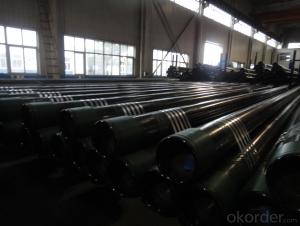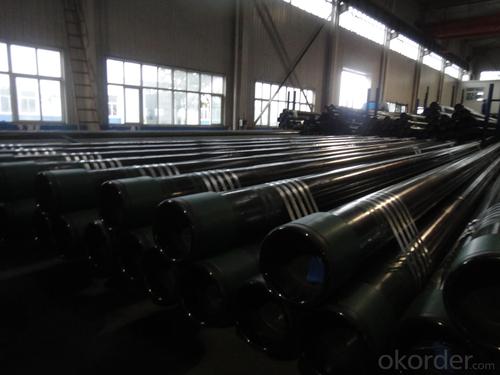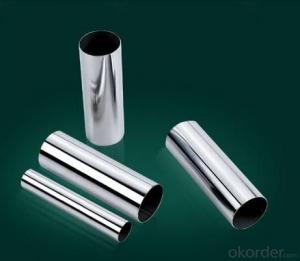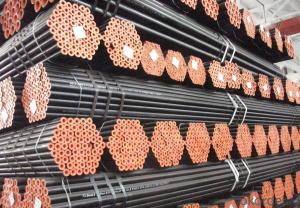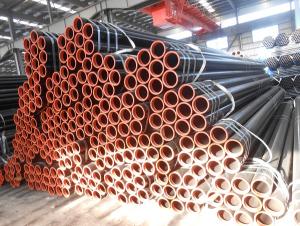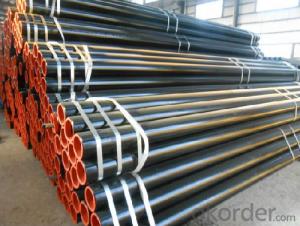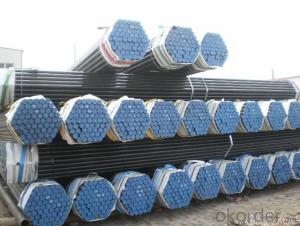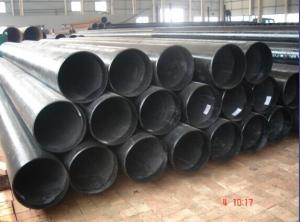Seamless steel API petroleum well casing pipe(STC/ LTC/ BTC )
- Loading Port:
- Shanghai
- Payment Terms:
- TT OR LC
- Min Order Qty:
- 10 m.t.
- Supply Capability:
- 100000 m.t./month
OKorder Service Pledge
Quality Product, Order Online Tracking, Timely Delivery
OKorder Financial Service
Credit Rating, Credit Services, Credit Purchasing
You Might Also Like
SPECIFICATION
continuous slot screen,pipe base screenperfor,ated tube,slotted pipe, sieve strainer,gas strainer,casing pipe
length:≤12m (each)
outside diameter :26.7mm-508mm
thread: BTC,LTC,STC
slot width:(0.10-4)mm±0.03mm
slot number:as per customer's requirement
slot shapes:straight in line pattern, staggered pattern ,spiral pattern
slot space:as per customer's requirement
slotted casing with apertures of 0.20-6mm are wide used in prevention of oil and wells
- Q: What does "1.5" steel tube mean?
- DN refers to the nominal diameter of the pipe (also known as nominal diameter), all piping accessories in the piping system are numerically represented in order to distinguish the parts that are represented by threads or outside diameters. Nominal diameter is used as a reference, after rounding the figures, and processing numerical value is not exactly the same, nominal diameter can be expressed as metric mm, also can be used in English in.
- Q: Are steel pipes suitable for use in chemical plants?
- Yes, steel pipes are suitable for use in chemical plants. Steel pipes offer excellent resistance to corrosion, high durability, and can withstand high temperatures and pressures commonly found in chemical processing. Additionally, steel pipes can be easily welded, making them versatile for various chemical applications.
- Q: Can steel pipes be used for hydronic heating systems?
- Yes, steel pipes can be used for hydronic heating systems. Steel pipes are commonly used in hydronic heating systems due to their durability, strength, and ability to withstand high temperatures and pressures. They are also resistant to corrosion, making them suitable for long-term use in these systems.
- Q: How are steel pipes used in the construction of oil storage tanks?
- Steel pipes are used in the construction of oil storage tanks as they provide strength and durability to withstand the weight and pressure of the stored oil. These pipes are utilized for the tank's structural framework, ensuring stability and preventing leakage. Additionally, steel pipes are commonly used for the tank's piping system, allowing for the transportation of oil in and out of the storage facility.
- Q: What is the difference between internal lining and external coating of steel pipes?
- The internal lining of steel pipes refers to a protective layer or coating applied inside the pipe to prevent corrosion and to enhance the flow of fluids. This lining is typically made of materials like epoxy, cement mortar, or polyethylene, and it helps to reduce friction and resist the effects of chemicals or contaminants that may be present in the fluid being transported. On the other hand, the external coating of steel pipes is a layer or coating applied to the outside of the pipe to protect it from external factors like weather, soil, or mechanical damage. This coating is usually made of materials such as fusion-bonded epoxy, polyethylene, or polypropylene, and it acts as a barrier against corrosion, moisture, or abrasion. In summary, the internal lining of steel pipes focuses on protecting the pipe from the inside, while the external coating is intended to safeguard the pipe from external elements. Both the internal lining and external coating are essential for maintaining the integrity and longevity of steel pipes.
- Q: How are steel pipes used in oil and gas industry?
- Steel pipes are extensively used in the oil and gas industry for various purposes such as drilling, transporting, and processing oil and gas. They are primarily used as casing pipes, which provide structural support and prevent the collapse of boreholes during drilling operations. Steel pipes are also used for transporting crude oil and natural gas from the wellhead to processing facilities or distribution points. Furthermore, they play a crucial role in the construction of pipelines for long-distance transportation of oil and gas, ensuring efficient and reliable delivery. Additionally, steel pipes are utilized in the construction of oil and gas refineries and petrochemical plants for various processes, including fluid transportation, heat exchange, and storage.
- Q: How do you calculate the pipe pressure drop coefficient for steel pipes?
- To calculate the pipe pressure drop coefficient for steel pipes, you can use the Darcy-Weisbach equation, which takes into account factors such as the pipe length, diameter, roughness, and fluid flow rate. The coefficient can be determined using empirical correlations or charts based on these parameters, ensuring accurate estimation of pressure drop in steel pipes.
- Q: Are steel pipes suitable for use in food processing industries?
- Yes, steel pipes are suitable for use in food processing industries. Steel pipes are known for their durability, strength, and resistance to corrosion, making them ideal for handling food products. They are also easy to clean and maintain, ensuring proper hygiene standards in the food processing industry. Additionally, steel pipes are capable of withstanding high temperatures and pressures, making them suitable for various food processing applications such as transporting liquids, gases, and solids.
- Q: What are the factors affecting the lifespan of steel pipes?
- The lifespan of steel pipes can be influenced by several factors. 1. Corrosion is a primary factor that can considerably diminish the lifespan of steel pipes. Over time, exposure to moisture, chemicals, and other corrosive elements can result in rusting and degradation of the pipe material. 2. The environment in which the steel pipes are installed plays a vital role in their longevity. Extreme temperatures, humidity, and exposure to various weather conditions can expedite the corrosion process and weaken the pipe structure. 3. The quality of the water flowing through the steel pipes can also affect their lifespan. Water with high levels of acidity or alkalinity, excessive chlorine, or other contaminants can cause corrosion and deterioration of the pipe material. 4. The way steel pipes are installed can impact their lifespan. Poor installation practices, such as inadequate support or incorrect alignment, can create stress points and structural weaknesses, making the pipes more susceptible to failure. 5. Regular maintenance and timely repairs are crucial for maximizing the lifespan of steel pipes. Proper cleaning, inspection, and corrosion protection measures can help identify and address potential issues before they escalate and cause significant damage. 6. The design and quality of steel used in pipe manufacturing are important factors in determining their lifespan. High-quality steel with appropriate alloy composition and thickness provides better resistance to corrosion and mechanical stress, ensuring a longer lifespan. 7. The durability of steel pipes can be influenced by the load and pressure they are subjected to. Excessive pressure or frequent variations in pressure can stress the pipe walls, leading to fatigue or failure over time. By considering and addressing these factors, it is possible to extend the lifespan of steel pipes and ensure their reliable performance over an extended period of time.
- Q: What are the different methods of insulating steel pipes?
- There are several methods of insulating steel pipes, including using insulation wraps, foam insulation, fiberglass insulation, and pre-insulated pipe systems. Insulation wraps are typically made of materials like rubber or polyethylene and are wrapped around the pipe to provide thermal insulation. Foam insulation involves applying a layer of foam insulation directly onto the surface of the pipe. Fiberglass insulation is another common method, where fiberglass material is wrapped around the pipe to provide insulation. Pre-insulated pipe systems are complete pipe systems that come with built-in insulation and are ready to be installed. These methods help prevent heat loss or gain in the pipes, maintain temperature control, and prevent condensation.
Send your message to us
Seamless steel API petroleum well casing pipe(STC/ LTC/ BTC )
- Loading Port:
- Shanghai
- Payment Terms:
- TT OR LC
- Min Order Qty:
- 10 m.t.
- Supply Capability:
- 100000 m.t./month
OKorder Service Pledge
Quality Product, Order Online Tracking, Timely Delivery
OKorder Financial Service
Credit Rating, Credit Services, Credit Purchasing
Similar products
Hot products
Hot Searches
Related keywords
